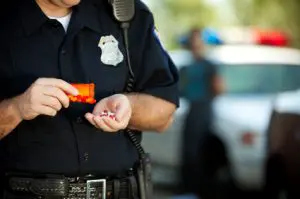 In the United States, individuals are prohibited from possessing certain drugs. There are federal and state laws that specify which drugs are illegal to possess and which drugs can only be obtained with a prescription. The penalties for drug possession charges are typically decided upon and enforced by state governments, although federal jurisdiction may be a deciding factor in some cases.
In the United States, individuals are prohibited from possessing certain drugs. There are federal and state laws that specify which drugs are illegal to possess and which drugs can only be obtained with a prescription. The penalties for drug possession charges are typically decided upon and enforced by state governments, although federal jurisdiction may be a deciding factor in some cases.
Drug Possession Charges
Drug possession laws prohibit not only the possession of the restricted substances, but also the possession of paraphernalia which may be used to consume the drugs or materials which may be used to manufacture the drugs. Possession of these materials in addition to simple possession of drugs may increase the charges, in some cases. Possession of drugs may also carry different charges depending on the quantity of the drug that is seized.
Simple Possession Charges
If an individual is charged with possessing a small amount of an illegal substance it is considered to be simple possession. In order to charge someone with simple possession, a prosecutor must prove that the defendant had access to the drugs and could control the drugs. This may mean that the defendant directly possessed the drugs or had access to the location of the drugs. If others also had access to the location of the drugs, however, the defendant may claim to have no knowledge or control over the drugs.
Possession with Intent to Sell Charges
If an individual is in possession of large amounts of a controlled substance, the individual may be charged with possession with intent to sell. This charge often carries higher penalties than simple possession. The quantity at which a charge changes to a distribution charge is clearly defined in some states for certain drugs. In some cases, however, distribution materials such as a scale and baggies may cause a charge to change from simple possession to possession with intent to sell regardless of the quantity.
Drug Possession Laws
The Controlled Substances Act of 1970 was enacted with the intention of regulating drug possession. The Act classifies controlled substances into categories known as Schedules. Schedule 1 drugs are considered to be the most harmful and carry the least amount of medical value, while Schedule 5 drugs are considered to be the least harmful and carry some medical benefit. The Schedules also take into consideration the addictive qualities of drugs. State and federal government agencies utilize this Act as a guideline for determining the severity of the charges and punishments surrounding drug possession.
According to the U.S. Food and Drug Administration, Schedule 1 drugs include:
- L.S.D.
- Peyote
- Morphine
- Heroin
- Marijuana
- Mescaline
- Psilocybin
Drug Possession Penalties
The penalties for drug possession may vary from state to state, but simple possession is typically considered a misdemeanor, while possession with intent to sell is typically considered a felony. A misdemeanor drug possession charge usually results in fines and drug classes. Probation, community service, and in some cases jail time may also be given as a penalty.
Felony Drug Charges and Penalties
Felony drug possession is determined by taking many different factors into consideration. Certain drugs or quantities of a drug may automatically incur a felony charge. The number of previous offenses, the proximity of the drug possession in relation to a school, and the presence of a minor in a drug possession situation may all contribute to drug possession being classified as a felony. Felony drug charges may be punishable by prison sentences up to and including life in prison and high fines.
Any felony charge also carries certain lifetime consequences, including:
- Negation of an individual’s right to vote
- Ineligibility to obtain certain licenses
- Ineligibility to purchase or own firearms
- Ineligibility to serve on a jury
Orlando Drug Possession Defense Lawyer
Following a drug possession charge, it is important to contact a lawyer that has experience dealing with drug possession laws and cases. Drug possession laws not only vary from state to state, but are constantly changing and being updated. A drug possession defense attorney will best understand the most current laws surrounding drug possession, and will be able to advise defendants on the best course of action.
Sources:
“Controlled Substances Act.” Controlled Substances Act. U.S.Department of Health and Human Services, 11 June 2009. Web. 21 May 2014.
View Article Sources
“Statutes & Constitution: View Statutes: Online Sunshine.” Statutes & Constitution: View Statutes: Online Sunshine. The Florida Statutes, 20 May 2014. Web. 21 May 2014.
View Article Sources
“The Controlled Substances Act of 1970.” Summary of Federal Laws –. The Catholic University of America, 9 Aug. 2010. Web. 21 May 2014.
View Article Sources
